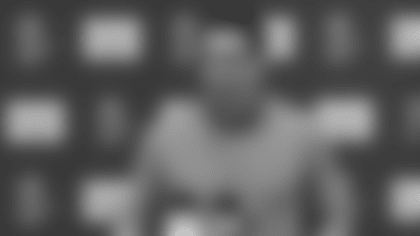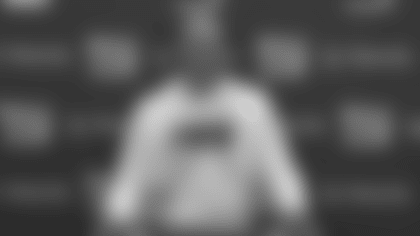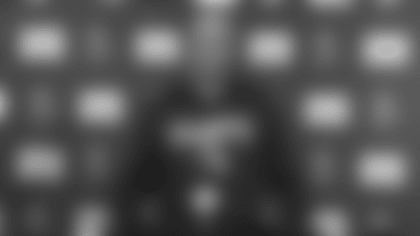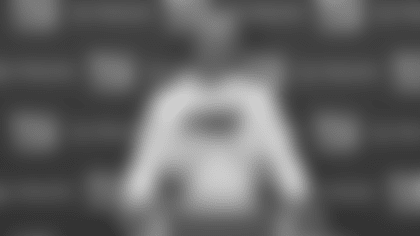Head Coach Brian Daboll
Q: I wanted to ask you specifically (about quarterback) Daniel (Jones) and (wide receiver) Darius Slayton, who came into the league together, built up some chemistry. When you look at systems, offensive systems change throughout the years, different concepts and what not. What elements of chemistry can carry over from year to year to year regardless of the system?
A: I think a lot. Those guys work a lot together during the week and then in the offseason. They throw a lot after practice. Again, reading a receiver's body language and having trust in them that they're going to be where they're supposed to be and make a play on the ball when you throw it to them, I think, is really important in quarterback play and receiver – call it skill play. That's really the passing game. You can get some zone coverages, which we got yesterday. And we got some man coverages like you do every week. So, one is having the confidence that your player, as a quarterback, is going to beat the player that he's going against, or in zone that they're going to be reading it the right way, getting the head turn the right way, knowing when to let it go. So, the more you can do that with the skill players as a quarterback, I think the more trust develops. And that's really what the passing game is. That's where it all starts.
Q: Can that chemistry kind of elevate a receiver's game, do you think, more so than maybe skill to a degree?
A: It's probably a combination of both. Again, there's a lot of things that need to go right in terms of the passing game. But certainly, the person throwing it, the person catching it – it starts there. So, you'd like to have as many talented players as you can (that) make good chemistry with one another. The only way you get that is by practicing, being out there and doing as much as you can do to improve that area.
Q: You said after the game that if you have to throw it 60 times, you'll throw it 60 times, that it's week to week. But you guys have kind of settled into a pretty steady run-heavy game plan week to week. Just curious the process of coming to that point. What goes into (it)? How did you figure out that that was the best path for this team to win games?
A: I think it starts after you go through - the coaches and the players right now are meeting, going through our game. You make the corrections that you need to make on our game, and then you sit down with the advance scout. You go through the scouting report of the team you're about to play. Again, you want to try to use your players' strengths the best you can. Again, it's Week 11; I think we have a fair idea of what some of those are. But then the coaches sit down. They watch the opponent. They go through. They have a lot of discussions. When I'm looking at it, I'm looking at it holistically in terms of the kicking game, defense and offense and just how I think we need to play the game to win. As a coordinator, it's a little bit different. When I was a (offensive) coordinator, you want to obviously score as many points as you can, you're not really focused on the other areas of the team. So, I'll give them my thoughts on what I think we need to do collectively to win. And then they do a good job of communicating with each other and coming up with whatever that might be. It could be a certain type of run or a certain type of pass we want to use. And then everything is talked about (and) put in. And we go through situations of what we like. And then I think ultimately at the end of the day, when you're calling a game, you get a feel for how the game's going – let's just call it – after the first quarter. There's a lot of things that happen in the first quarter where they're kind of schemed up; maybe they are game plan things. And usually the game settles in, and you've got to do a good job of kind of figuring that out of how you want to play and the things you want to use.
Q: If I could ask one more on (running back) Saquon (Barkley) – I think pass protection was viewed as a weakness, really, early in his career. What have you seen from him this year? What has he gotten better from (when you watch him)? Maybe it's on film.
A: He's sound in his assignment. He knows who to block, and he's getting there. Certainly, we can still improve in that area. I'm sure there's a few plays he'd like to have back. He got in the way. The biggest thing in pass protection is not letting the person you're responsible for make the play on the quarterback, and he's done that. But there's certain things that we can correct – not just Saquon, but all the (running) backs on how we'd like to get it done.
Q: I'm wondering how you feel your offensive line is playing. And if you could possibly allow yourself to look ahead for a moment to an area when you have eight guys that you trusted yesterday, and you could get (guard Ben) Bredeson, (guard Shane) Lemieux and (tackle) Evan Neal back, and all of a sudden, you have experienced starters on the bench – what kind of luxury that is.
A: Depth at that position – I think we talked about this last week – depth at that position is always critical. And I would say it's critical in November and December, and I think some of our guys are getting healthy. We'll see where Shane is this week. I think Ben is getting a little bit better. Evan's getting better. So, it's good to be as healthy as we can be. (We're) certainly not there yet, but (we're) moving in that direction. And that's the foundation of an offense is the offensive line play. Five guys or sometimes six, sometimes seven, sometimes eight working together as one. I think our guys up front have improved from a week-to-week basis. I think they understand what we're trying to get done. It's never going to be perfect. You're playing against some really good defensive linemen, and things happen. But I think we're making progress, and it's good to have as many of them out there as we can.
Q: Now I'm going to ask you about the run game. We give Saquon his due credit all the time. How good an offensive line (do you have)? Like did you guys build an offensive line thinking 'We're going to run the ball. We want really good run blockers.' Does it happen to be that most of these guys' strengths, not to knock their pass blocking, but did most of these guys seem to be better run blockers? Was that the idea, or is that a fortunate coincidence?
A: I think we just try to find the best guys that we thought at that particular time fit our system and that we thought were good football players. It's a tough job. It's a lot easier, as an offensive lineman would say, going forward than it is backwards when you have those guys rushing at you. So again, our guys they got to do everything just like every offensive lineman in the league has to. They've got to pass protect. They've got to run block. They've got to be good on screen game, perimeter game. They've got to communicate well. So, it wasn't just set, 'Let's get a bunch of run blockers,' because I don't think you can do it that way. You have to find guys that can do both. And I think our guys have steadily improved, and we're still working at it. And we'll continue to do that.
Q: You mentioned before that as a coordinator, your main concentration is you want to score points. Is the way this team is playing on offense this year more conducive to you as a head coach than it is a coordinator? You were a coordinator more than you were a head coach, and the way this team is winning – not scoring a lot of points – is it great for the head coach, but you might have dealt with it differently as a coordinator?
A: No. I just like to win. That's the name of the game. It's hard to do that in this league, and whatever we need to do for that week, you always put the team first. Whether you're a play caller – obviously I'm the head coach now – but our whole objective is to do what we need to do that week to give ourselves a chance, coach and play well. That's really all my focus is on.
Q: You think there will be a time this year when you will need to throw it to win – 35, 40 times? You really haven't had to this year. Do you think you will, and is this offense built to do that if need be?
A: I don't know. You practice that each week. You're ready, and you try to be as ready as you can in every situation. I think you just take each game as they come, and coach and play the way you need to play for that week.
Q: Did you guys come out of that game healthy, or is there anything major that came out of that?
A: I think we're in pretty good shape after that game. We'll see on Wednesday, but I think it (the injury report) will be probably a little bit similar to what it was last week. (Tight end Daniel) Bellinger's making progress. Evan's (Neal) making progress. (We have) some bumps and bruises here and there, but (we're) really fairly healthy.
Q: With (defensive lineman) Dexter Lawrence every stat, every metric you can find shows that his pass rush has been significantly more successful this season. I'm wondering what you attribute to that. Is there anything significantly different that he's doing, or you guys are doing with him?
A: Well, he's a good football player. Give credit to the player first and foremost. I think he's worked hard at his craft since I've been here. He's a great teammate, great leader, and he's done a good job of getting better and improving his craft. So, he gets most of the credit, but I think that (defensive line coach Andre) Patterson and (assistant defensive line coach Bryan) Cox have done a great job with really all our defensive lineman, with every single one of them. They're fantastic coaches, very good technique coaches. Have a lot of experience. I think they've helped the players improve. I think the players are very thankful that they have those two guys as their coaches. So, it's been a good match.
Q: How much does him being lined up over the center as sort of a straight nose tackle you think benefit him in that regard?
A: Yeah, he's a load and the centers whether they have their head down or they have them up they've still got to execute the snap. We've been playing him there; we haven't moved him around maybe as much as he's been moved around in the past, but I think he's been very effective with what we've asked him to do. Obviously, we have a certain package where you see him in different spots and things like that, but he's done a good job really wherever he's lined up this year for us. He's a very good teammate for us and he's doing a good job.
Q: I don't know how much you guys pay attention to what guys say in the locker room to the media, to us after the game's during the week. We had a conversation with (wide receiver) Kenny (Golladay) yesterday, what you thought about his answers and if you have had a conversation with him about what his role is going to be moving forward.
A: I have conversations with our guys all the time, I'll keep those private. Again, all I expect these guys to do is come in on Wednesday, learn from the tape, go out to practice, have a good week at practice and then by the end of the week we'll decide where everybody fits and that's how we approach it. Really not much more than that.
Q: On the defensive side of the ball, obviously going into last week's game with (safety) Xavier (McKinney) out, there was so much talk about communication, relaying the signals whether it be (safety) Julian (Love) or somebody else. Now that you're out of the game, how would you assess how that entire process went? Do you anticipate sticking the same way moving forward to the next game based on what you observed yesterday?
A: You're talking about with Julian as the green dot wearer?
Q: Yeah, and just in terms of the communication.
A: Yeah, it was good, Julian did a great job like he did all week leading up to it. Now he understands our system and I think he's a good communicator, he's intelligent. I think it was smooth. Really from his point to the second level of the defense to the defensive line. I think those guys did a good job of communicating throughout the game and obviously he's the one that's wearing the green dot and it starts with him.
Q: Is there any more of your children who have a birthday coming up and have they asked you to make the playoffs?
A: No, the next birthday in our house is January 27th. That's our oldest daughter.
Q: Has she asked you to go to the Super Bowl?
A: No, she's going to be 18 she knows how the routine works. The little one was happy yesterday and so was I, because she was.
Q: I guess I'm kind of beating around the question, but have you let the playoffs get into your thought pattern yet?
A: No. Again, it's fairly easy not to let that happen. Maybe when I was younger starting out in this league, in 2000, 2001. I remember 2000 we were 5-11 I think and then we started out 1-3 and each game we built a little bit of momentum, and I'm a young coach. Then the next year we don't make the playoffs and then the two years after that we win two more Super Bowls, and when you're younger a little bit and just starting out I think maybe you think about things like that. Now it's the God's honest truth you just worry about the next day, the meeting we were just having, practice. I know it's boring but that's the truth. We have to focus and stay in the moment because it really doesn't matter. There're so many games to be played and it's good to be 7-2 but again it will humble you really quick when you start worrying about the wrong things or thinking about the wrong things to me in this business.
Q: Obviously Detroit is your focus Sunday, but you do have a game four days later on Thanksgiving. So as a first-year head coach can you start peeking into Dallas a little bit before Sunday or do you wait until Sunday night? How are you going to approach it?
A: We've had a routine here the last few years of playing on Thursday night games and you get your work done for the opponent you're playing this particular week and then when things settle down towards the end of the week, there's no other way to do it then to start getting ahead on the next team. That's not big elaborate meetings, that's just position coaches having to stay a little extra and put some work in because there's only so much time in a day that you've got to be ready to go once that other game is (done), they'll be working in here Sunday after we play. I think right now the focus for today all the way through Friday evening is really where we've got to stay at. There is definitely scheduling processes and conversations that need to be had to make sure you're prepared the way you think your team needs to be prepared. That's physically and mentally.
Q: You had an animated conversation with (guard) Jack Anderson after the false start. What makes you feel like you have to communicate in that way in that moment? What's the purpose behind it?
A: I don't know, I don't think about it. You see it after and you're like, 'I wish I didn't do that', sometimes. I wear my emotions on my sleeve, and I've told Jack that. I talk to my players all the time or my coaches. There're some things that I like to help but I can't help sometimes, probably how I was raised. I'll even get that way with myself. I talk to myself when I think I've made a dumb decision or do something that I shouldn't have done. Again, I don't think about it. It just happens naturally and we're in a critical situation of the game. Fourth and one that we were going to go for it, again I understand mistakes happen and I've got a lot of confidence in Jack just like I do all the other players. At that particular time, I (was) just, not happy and whatever I say I say. I think I apologized later.
Q: Do you think it's good sometimes to try and get your message across that way?
A: I don't know. At that particular time probably, yeah. Whatever I'm feeling I do.
Q: I think you've kind of alluded to this. Do you always feel the need to circle back (with the person)?
A: Yeah, no doubt about that because it's a relationship driven business too. Look, I've made plenty of mistakes and I'm hard on myself. I understand that got caught on camera. Do I like it? No. There're times where I say, 'Man I wish I was a little more laid back?' Probably. But that's me.
Q: You've never yelled back at yourself, have you?
A: Yeah. Probably, yeah. I don't mind it when other guys yell back either.
Q: Just wondering if (center) Jon Feliciano is going to be able to practice this week or he'll be limited only because he seemed like he was laboring late in the game.
A: Yup. I think he'll be good.
Cornerback Adoree' Jackson
Q: I'm curious what it was like back there returning punts yesterday?
A: Catching punts was more like a nostalgic feeling for me. Just being able to be back there had me feeling like when I was back at SC (University of Southern California) or when I was returning my rookie year at Tennessee. It was fun, it was one of those things where I always remember when (USC safety) Su'a Cravens did it, and he barley caught punts when he went back there and caught with us, it was like riding a bike- second nature. To finally get a real game feel, like two years – that was a nice feeling.
Q: What about this notion that a lot of people say you're too valuable on defense to put back there? What do you think about the injury risk, the added injury risk of being in that position?
A: I appreciate the thought, but at the same time – I love playing the game, I love having fun. It's something I've always been doing. If that's the case, I've been doing it probably since Pop Warner, high school, SC. SC let me play all three ways, so. Did it a little bit in the league. I feel like just being able to go back there having fun, enjoying what I'm doing, but also just being smart at the same time.
Q: That being smart point – did the coaches give you any tips? Like be a little conservative here, we don't need you taking a big shot or?
A: No. They let me be me but at the end of the day, understanding that I'm not being too extra for short returns or worse. Just going out there, doing my job, catching the punt and trying to get what I can get. We're not forcing anything, really.
Q: How big was it to get some takeaways yesterday? One of the things (safety) Xavier (McKinney) always talks about is after games where you guys don't get takeaways – when you don't, he gets upset about that. How nice was it to get some takeaways in the first game you don't have him available?
A: It was huge, especially having those takeaways happen in the red zone at the time that they did, really game-changing plays. Just to get turnovers in general is a blessing and trying to play complimentary football, help out the offense, help out special teams and vice versa. They're making plays, so we're just trying to compliment them. We get them in the red zone coming in clutch – that was pretty huge.
Q: What was Xavier like on the sideline yesterday?
A: He was like a mini coach. He was out there pep-talking everybody up. Just being a positive word and giving affirmations and just trying to give insight of what he sees, what he knows off his film study and be an extra ear for us out there.
Q: Do you feel like in the second half these last eight games that you guys do need to get more takeaways defensively? You've done a lot of good things in the red zone but is that one of the emphasis that you guys had coming out of the bye?
A: I think our emphasis every week is to try to get takeaways and try to get our hands on the ball whether it's forcing a fumble or interception. As a defense, that's one of the best things that you can do is get a takeaway.
Q: You're a guy who never comes off the field. What kind of mindset is that? You're used to doing that but there's a certain fitness that is required running with these guys play after play after play and never getting a break. Could you use a break or do you like being in 60-70 snaps?
A: I'm just out there playing and having fun. It's kind of like being at practice. You just go out there, get all the reps that you can get exerting yourself, really, at practice so that when the game comes you try to make the practice harder and strain yourself a lot harder than what may happen in the game. For us when we're out there, there's never a thought of needing a break, whatever it may be. Just go out there and keep competing for however long it takes.
Q: Do you feel that the Monday through Friday stuff prepares you for Sunday like you said? Or is there a time where you're going to need to take a step back during the week so you can play every snap on Sunday?
A: I think for us, taking care of our bodies the way that we do – hydrating, getting sleep, eating right and then getting the lifts in. Right after the game getting that soreness, that tightness or whatever it is out of your body to get you back going and get you back moving and feeling good. I think the coaching staff, strength staff, (athletic) trainers and nutritionist do a great job helping us get throughout the week.
Q: Is that something you knew coming into the league? A lot of times rookies are 20 years old, they feel like they can run around all day and maybe they don't do that. Did you do that then? Did you have to learn that? Is that something you can teach a guy like (safety) Dane (Belton), who played every snap yesterday and maybe doesn't know that yet?
A: It was told to me. When you're young, your body feels young at the end of the day. It's something that you gradually learn. Everybody has their own routine or regiment of things that they do. As rookies coming in, they do a great job at the college level to help prepare. I think there's some things that you learn, and you just add from different vets to see what they do, see what they use and try to implement it to your routine.
Q: You mentioned what Xavier was like on the sideline, what was it like not having him on the field?
A: It was kind of like he was still there in a sense. Having him come to the sideline, being able to chop it up with him, seeing him with is little headset in pumped up. It's kind of like he was still out there with us at the end of the day. At the same time, we're still trying to – we have this thing where we try to hold each other accountable and play for one another and not disappoint our brothers. Even though he wasn't out there, I was trying to not disappoint him on the sideline.
Q: How is it different when the ball is snapped? Not having him, having a rookie play back there and having (safety) Julian (Love) play deep more. Did things change for you at all?
A: Starts off the week with communication. I feel like we do a great job throughout the week communicating, seeing the things that we look and how we are going to play certain things throughout the game. Having that same accord and being on the same page going throughout the week helps when we get to game day.
Wide Receiver Darius Slayton
Q: It just seems like right from the get-go, you and (Quarterback) Daniel (Jones) developed chemistry almost instantly. Can you just think back for a moment as to what it was that just helped you guys connect so quickly as rookies? You guys built on that throughout the years, and even when things changed with different systems and whatnot, you still seemed to have it. What is it about working with Daniel that just makes you guys click?
A: I think just the familiarity. Literally our first day as New York Giants was together. (We) took a lot of reps together our rookie year; we were kind of on the second and third team, both worked our way up to the first team and obviously have played three going on four seasons now together. I think that familiarity helps us be able to make it work despite whatever is changing around us.
Q: Do you think there's more meat on the bone there for the passing game? Do you think at some point, if other teams take away the run or a game is just different or if you guys fall behind in a game, that you guys will be able to throw your way to a victory instead of running it to a victory?
A: I'd definitely say there's more meat on the bone. Obviously, we had some pass plays in the game that we could've been a little better on in a couple of spots or got some more completions here or a big play there. At the end of the day, the objective is to win the game. Whether we have to throw it 50 times or run it 50 times, I think we're all on the same page. We're all just trying to win the football game.
Q: Is this team built to throw it 40 or 50 times, if need be, do you think?
A: We'll find out when it comes to that, won't we?
Q: As far as the mindset of a receiver, you got a lot of playing time yesterday. You got four targets. When you're running it 47 times, there's not going to be a lot of targets. Does it make each target more meaningful, more important kind of thing? And what is the patience required to block, then run a route, then block more. It's different than some of the other receivers you see in the league here.
A: Yeah, but kind of the reality of a receiver is, that's kind of what it is. You're always running to not get the ball more than you are to get it. Even the top receivers in the league, even if they catch eight to 10 balls in a game, there are 60 plus plays in a game. Even if they're not blocking, they're running – and they're not running and getting the ball. So, it's just kind of the reality of the position and kind of a mindset you always have to have. Whether you throw it 40 times or you run it 40 times, it's not coming to you 40 times. You've got to always be patient and just capitalize on opportunities when they come.
Q: Now that you're back, kind of heavily featured, what was it like those first two weeks? You're a healthy scratch, and you barely played in Week 2. What was that like for you?
A: It was obviously a little different. I hadn't really experienced that yet in my career so far. I kind of just approached it like everything else – made sure I was on my plays, made sure I was keeping my body right, things like that. Making sure I was going to be ready when my opportunity came.
Q: Is that sort of easier said than done though when, again, you're a guy that's used to playing a lot and getting the ball and then to not be in that position?
A: Yeah. Like I said, it was different – something I hadn't really experienced. But I was able to work through it and make it work.














